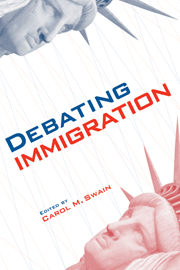Book contents
- Frontmatter
- Contents
- About the Contributors
- Preface
- Acknowledgments
- 1 Introduction
- PART I PHILOSOPHY AND RELIGION
- 2 The Disconnect between Public Attitudes and Policy Outcomes in Immigration
- 3 Carved from the Inside Out
- 4 A Biblical Perspective on Immigration Policy
- 5 The Moral Dilemma of U.S. Immigration Policy
- PART II LAW AND POLICY
- PART III ECONOMICS AND DEMOGRAPHICS
- PART IV RACE
- PART V COSMOPOLITANISM
- PART VI CONCLUSION
- Notes
- Index
5 - The Moral Dilemma of U.S. Immigration Policy
Open Borders Versus Social Justice?
Published online by Cambridge University Press: 05 June 2012
- Frontmatter
- Contents
- About the Contributors
- Preface
- Acknowledgments
- 1 Introduction
- PART I PHILOSOPHY AND RELIGION
- 2 The Disconnect between Public Attitudes and Policy Outcomes in Immigration
- 3 Carved from the Inside Out
- 4 A Biblical Perspective on Immigration Policy
- 5 The Moral Dilemma of U.S. Immigration Policy
- PART II LAW AND POLICY
- PART III ECONOMICS AND DEMOGRAPHICS
- PART IV RACE
- PART V COSMOPOLITANISM
- PART VI CONCLUSION
- Notes
- Index
Summary
IMMIGRATION POLICY AS A MORAL DILEMMA
How should we think about U.S. immigration policy from the standpoint of basic justice, especially distributive justice, which encompasses our obligations to the less well-off? Does a justifiable immigration policy take its bearings (in part) from the acknowledgment that we have special obligations to “our own” poor, our least well-off fellow citizens? Or, on the other hand, do our moral duties simply argue for attending to the interests of the least well-off persons in the world, giving no special weight to the interests of the least well-off Americans?
As is clear from other chapters in this volume, there are reasons to believe that recent American immigration policy has had a deleterious impact on the distribution of income among American citizens. According to influential arguments – associated with George Borjas and others – by admitting large numbers of relatively poorly educated and low-skilled workers, we have increased competition for low-skilled jobs, lowering the wages of the poor and increasing the gap between rich and poor Americans. The high proportion of noncitizens among the poor may also lessen political support for social welfare policies.
How should we think about the apparent ethical conflict between, on the one hand, the cosmopolitan humanitarian impulse to admit less well-off persons from abroad who wish to immigrate to the United States and, on the other hand, the special obligations we have to less well-off Americans, including or especially African Americans?
- Type
- Chapter
- Information
- Debating Immigration , pp. 63 - 82Publisher: Cambridge University PressPrint publication year: 2007
- 26
- Cited by



